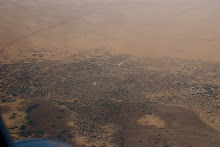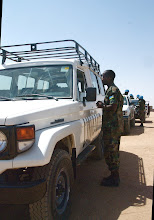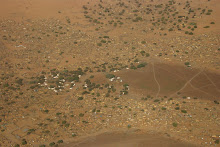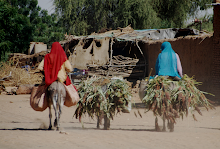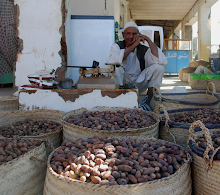Media reports this week cite growing concern over ‘denial of humanitarian access’ in Darfur. Although such denial certainly exists, many of the actors being denied – in the form of travel bans, visa refusals, car-jacking, etc - are not strict ‘humanitarians,’ but a loose community of NGO’s whose right to intervene is debatable.
International law guarantees the protection of humanitarian space and actors – defined as neutral and impartial – in order to meet pressing needs of a population in wartime. The International Committee of the Red Cross as well as a few other agencies, such as MSF (Medecines Sans Frontiers) who define themselves by these focused principles, continue to fulfill this role.
But because human rights and civilian protection norms have expanded, the NGO community now includes organizations focused on education, counseling, women’s empowerment and other services. Which means, more and more, NGO’s are claiming the right of access, but not the responsibility. Their staff are not specialists in humanitarian law, the organizations participate in advocacy, provide statements to the media, or are linked with public figures. Yet, they still cry ‘denial of humanitarian access’ when their activities are blocked.
Humanitarian is a word used to self-describe - it’s not a laissez-passe to the destination of choice. NGO’s are guests in the countries in which they operate and can, legally, be expelled. Forfeiting neutrality means forfeiting the right to be present.
This conundrum is a stark reality in Darfur where an NGO setting up a medical clinic must face the decision to treat rape cases silently day-after-day, or to speak out against the violence and risk being expelled. Any NGO that chooses to be vocal knows they are making it more difficult for other organizations to establish care-facilities.
This problem has been exacerbated by the shrinking international state presence in Africa since the cold war. Now, when major events happen, the media and the Western world turn to the NGO’s on the ground for information and guidance. But an NGO that has made political statements in Uganda, cannot claim humanitarian status in Darfur.
So what does this mean for Darfuris? Confusion, duplication, obstruction, and lack of trust. A woman reporting a rape is never quite sure if it will be confidential – to whom or where the report will go. NGO’s repeat each others’ work because anyone conducting a nutrition or education assessment is reluctant to make it public. This has entrenched a culture of secrecy, competition, and non-transparency, as everyone tries to hide under the umbrella of humanitarian law.
Some organizations, such as Human rights Watch, have stepped boldly out into new territory – reporting and advocating very effectively but not maintaining a presence on the ground. The two extreme types of organizations (humanitarian and watch-dog) operate effectively under current international law, but the range in between is lost in the blurring lines.
We need a redefinition of terms and a rethinking of norms of access to allow different agencies to fulfill different roles. And we should start by clarifying the terms. Celebrities are not humanitarians, they are activists. OCHA – The Office for the Coordination of Humanitarian Affaires - is also the Office for the Coordination of NGO activity.
The government of a host country can and should be condemned for expelling organizations who report on rape and other topics – as a violation of free speech, or failure to protect its people – but is this really denial of humanitarian access?
Friday, October 24, 2008
Wednesday, October 15, 2008
Genocide by Urbanization?
“Generally speaking, genocide does not necessarily mean the immediate destruction of a nation… it is intended rather to signify a coordinated plan aiming at the destruction of essential foundations of the life of national groups, with the aim of annihilating the groups themselves. The objectives of such a plan would be the disintegration of the political and social institutions, of culture, language, national feelings, religion, and the economic existence of national groups, and the destruction of the personal security, liberty, health, dignity, and even the lives of the individuals belonging to such groups.”
Raphael Lemkin, credited with coining the word 'genocide,' 1943
A warrant for the arrest of President Bashir (indicted by the ICC on crimes against humanity, war crimes, and genocide in July) is expected any day, and it’s making everyone jumpy. It’s also ensuring that the topic comes up a lot in conversation– is Darfur, or is it not, properly called genocide?
Given that Ocampo, the ICC prosecutor, has staked his reputation and possibly the courts very survival on this case, I imagine he holds a ‘smoking gun’ piece of evidence on the subject. But, from what the international community has seen in the last few years, I think Darfur is genocide mainly in the second part of the definition - the long term destruction of a culture, leadership institutions, livelihoods, and way of life.
Humanitarians estimate that as many as 10,000 people were displaced this week alone in South Darfur, with the number killed in the 20’s and 30’s (The numbers of displaced in Darfur have consistently been far greater than those killed). Imagine rural America – Wyoming and Utah for example, as the last frontier of the American West – and swaths of people, 10,000 at a time, forced off their land and to the edges of Salt Lake City until 2.5 million people were camped out. The economy ceases to function, land is up for grabs, herds, gene pools, and knowledge die off, infrastructure is destroyed or abandoned, irrigation systems collapse and the land reverts to the wild. Social organization unwinds and people’s self-worth and faith in humanity is tested. Resentment builds and identities change.
But, if I take only those criteria, then Darfur is genocide by ultra rapid (albeit, targeted) urbanization. Across Africa communities are abandoning traditional fields for city slums in reaction to a group of push and pull factors similar to those in Darfur. Environmental degradation and population growth are reducing productivity and increasing competition in the country side. Rumors of wealth and jobs (often at international companies and organizations) to be found in urban areas are pulling people to the city centers, where they find the reality does not always match their expectations.
New arrivals at displaced camps here in Darfur are often happier than you would expect them to be – awed by the new people and surroundings, treated as guests by their fellow camp-mates, telling their story to people who care, and expecting food and schooling. The reality of the tedium and degradation of displaced life takes a little while to set in. And the possibility of returning dims as instability increases, land ownership is confused and social ties mixed-up.
We tend to think of refugees as temporary, but they are much more often permanent. When there is finally peace in Darfur, the challenges faced by the population will be very similar to those around the world – building habitable cities and adapting to modern legal and cultural institutions.
The violence in Darfur is unique and very real, but the effects are at least comparable to the rapid and increasingly desperate urbanization happening around the developing world - does the fact that one group of people is forcing another into this situation qualify it as genocide?
Raphael Lemkin, credited with coining the word 'genocide,' 1943
A warrant for the arrest of President Bashir (indicted by the ICC on crimes against humanity, war crimes, and genocide in July) is expected any day, and it’s making everyone jumpy. It’s also ensuring that the topic comes up a lot in conversation– is Darfur, or is it not, properly called genocide?
Given that Ocampo, the ICC prosecutor, has staked his reputation and possibly the courts very survival on this case, I imagine he holds a ‘smoking gun’ piece of evidence on the subject. But, from what the international community has seen in the last few years, I think Darfur is genocide mainly in the second part of the definition - the long term destruction of a culture, leadership institutions, livelihoods, and way of life.
Humanitarians estimate that as many as 10,000 people were displaced this week alone in South Darfur, with the number killed in the 20’s and 30’s (The numbers of displaced in Darfur have consistently been far greater than those killed). Imagine rural America – Wyoming and Utah for example, as the last frontier of the American West – and swaths of people, 10,000 at a time, forced off their land and to the edges of Salt Lake City until 2.5 million people were camped out. The economy ceases to function, land is up for grabs, herds, gene pools, and knowledge die off, infrastructure is destroyed or abandoned, irrigation systems collapse and the land reverts to the wild. Social organization unwinds and people’s self-worth and faith in humanity is tested. Resentment builds and identities change.
But, if I take only those criteria, then Darfur is genocide by ultra rapid (albeit, targeted) urbanization. Across Africa communities are abandoning traditional fields for city slums in reaction to a group of push and pull factors similar to those in Darfur. Environmental degradation and population growth are reducing productivity and increasing competition in the country side. Rumors of wealth and jobs (often at international companies and organizations) to be found in urban areas are pulling people to the city centers, where they find the reality does not always match their expectations.
New arrivals at displaced camps here in Darfur are often happier than you would expect them to be – awed by the new people and surroundings, treated as guests by their fellow camp-mates, telling their story to people who care, and expecting food and schooling. The reality of the tedium and degradation of displaced life takes a little while to set in. And the possibility of returning dims as instability increases, land ownership is confused and social ties mixed-up.
We tend to think of refugees as temporary, but they are much more often permanent. When there is finally peace in Darfur, the challenges faced by the population will be very similar to those around the world – building habitable cities and adapting to modern legal and cultural institutions.
The violence in Darfur is unique and very real, but the effects are at least comparable to the rapid and increasingly desperate urbanization happening around the developing world - does the fact that one group of people is forcing another into this situation qualify it as genocide?
Monday, October 13, 2008
Toxic Justice
A recent article in the New York Times claimed that the US Supreme Court’s influence on legal institutions around the world is waning – a result of the US’s departure from the path of multilateralism and universal human rights.
But even if the formal judicial influence of America is fading, our informal quasi-judicial concepts are spreading quickly and effectively.
Soon after ‘terr’rist’ became a household word in the United States, governments around the world dismissively labeled rebels, journalists, and human rights organizers as terrorists. And, when US courts decided that ‘foreign fighters’ are not entitled to habeas corpus, they made it much easier for other regimes to get off the rule-of-law hook with anyone who could feasibly be called a ‘foreign fighter.’
And now, so quickly, the lingo of the financial crises is spreading - Greed and toxicity can conveniently be blamed for everything. Instead of bucking up and calling the crisis what it is - regulatory weakness, mismanagement, political pressure, risky trading, etc - we can call it a “toxic spread.”
Now in Sudan, we start to see the International Criminal Court’s indictment of the president on genocide charges labeled as ‘toxic,’ and the result of Western ‘greed.’
This is part of what I find so scary about Govenor Palin’s debate lingo - Blaming vague, nebulous, and evil concepts for real problems legitimizes them. We might think the tendency of American political rhetoric to blame issues on ‘predators,’ ‘extremists,’ and ‘snobs’ could only be damaging to ourselves, but it goes much further.
But even if the formal judicial influence of America is fading, our informal quasi-judicial concepts are spreading quickly and effectively.
Soon after ‘terr’rist’ became a household word in the United States, governments around the world dismissively labeled rebels, journalists, and human rights organizers as terrorists. And, when US courts decided that ‘foreign fighters’ are not entitled to habeas corpus, they made it much easier for other regimes to get off the rule-of-law hook with anyone who could feasibly be called a ‘foreign fighter.’
And now, so quickly, the lingo of the financial crises is spreading - Greed and toxicity can conveniently be blamed for everything. Instead of bucking up and calling the crisis what it is - regulatory weakness, mismanagement, political pressure, risky trading, etc - we can call it a “toxic spread.”
Now in Sudan, we start to see the International Criminal Court’s indictment of the president on genocide charges labeled as ‘toxic,’ and the result of Western ‘greed.’
This is part of what I find so scary about Govenor Palin’s debate lingo - Blaming vague, nebulous, and evil concepts for real problems legitimizes them. We might think the tendency of American political rhetoric to blame issues on ‘predators,’ ‘extremists,’ and ‘snobs’ could only be damaging to ourselves, but it goes much further.
Saturday, October 11, 2008
Complexity
A lot has been written lately on the complexity of the Darfur Crisis – armed groups have splintered and lawlessness has led to an increase in banditry and opportunism. Pundits disagree on the numbers killed and displaced, the main perpetrators, and the moral lines.
But very little has been written on the complexity of the humanitarian response itself. There seems to be a general consensus that if we had more humanitarians on the ground, things would be better. Little is said of the legal and ethical lines being walked by the international community, not to mention the almost insurmountable physical challenges to successful peacekeeping in the area.
Iraq analysis has often served as a foil to Darfur in the media - the discussion of the complex internal dynamics in Iraq fueling a civil war, the perception of American troops on the ground, etc vs. the characterization of an Arab ‘genocide’ in Darfur – so much so that some Darfur advocacy groups have pushed the slogan “Out of Iraq and Into Darfur.”
Missing from the Darfur issue is public discussion on the interface between humanitarians and the place, the people, and the conflict. Humanitarians, by their very motives, seem excused from this scrutiny. But, the international presence in Darfur is similar to interventions elsewhere, like Iraq, and has an enormous impact on an inter-state conflict. There is no such thing as a neutral - and a balanced impact is the best we can hope for. Our presence can fuel an insurgency, give legitimacy to armed groups, provide targets that win popular support, increase arms availability, etc.
Imagine first the physical challenges - UNAMID is a billion dollar a year mission, pasted on to a small town in an enormous desert. Fuel, generator parts, computers, paper, pens, chairs….everything…must be shipped by sea to Port Sudan, where the containers are unloaded onto trucks for 3,000 mile journey, 1,000 of which are not only unpaved, but untracked. The trucks must go around each little bush, into and out of each little ravine. And upon arrival they must be unloaded without a crane.
There are 10,000 people in the Mission who need heath care, food, water, and benefits. We are building a medium sized city from scratch, with mostly imported goods, in the middle of Africa. Imagine.
Which lead to the political challenges - Thousands of displaced people see the cars and trucks going by, but haven’t yet seen much improvement or tangible support. Men on horseback with AK-47s hijack Armored Personal Carriers because the UN cannot afford (politically) to shoot ‘civilians.’ Fuzzy relations with contractors hired to build the city who may have fuzzy relations with any number of groups creates conflicts on interest.
There is opportunism on all sides. Displaced Persons’ camp leaders exaggerate numbers to increase relief supplies. NGOs exaggerate problems or their ability to solve them to increase funding.
And there is tension between all the actors in a very stressful, high-stakes situation. Some NGOs have already been pressured to leave Darfur by the government, claiming that their work contributed to the evidence in the ICC documents indicting President Bashir. Some organizations emphasis on accountability prevents others from working, and vise versa.
These are the type of issues I will explore, hopefully slower and more coherently, in this blog :)
But very little has been written on the complexity of the humanitarian response itself. There seems to be a general consensus that if we had more humanitarians on the ground, things would be better. Little is said of the legal and ethical lines being walked by the international community, not to mention the almost insurmountable physical challenges to successful peacekeeping in the area.
Iraq analysis has often served as a foil to Darfur in the media - the discussion of the complex internal dynamics in Iraq fueling a civil war, the perception of American troops on the ground, etc vs. the characterization of an Arab ‘genocide’ in Darfur – so much so that some Darfur advocacy groups have pushed the slogan “Out of Iraq and Into Darfur.”
Missing from the Darfur issue is public discussion on the interface between humanitarians and the place, the people, and the conflict. Humanitarians, by their very motives, seem excused from this scrutiny. But, the international presence in Darfur is similar to interventions elsewhere, like Iraq, and has an enormous impact on an inter-state conflict. There is no such thing as a neutral - and a balanced impact is the best we can hope for. Our presence can fuel an insurgency, give legitimacy to armed groups, provide targets that win popular support, increase arms availability, etc.
Imagine first the physical challenges - UNAMID is a billion dollar a year mission, pasted on to a small town in an enormous desert. Fuel, generator parts, computers, paper, pens, chairs….everything…must be shipped by sea to Port Sudan, where the containers are unloaded onto trucks for 3,000 mile journey, 1,000 of which are not only unpaved, but untracked. The trucks must go around each little bush, into and out of each little ravine. And upon arrival they must be unloaded without a crane.
There are 10,000 people in the Mission who need heath care, food, water, and benefits. We are building a medium sized city from scratch, with mostly imported goods, in the middle of Africa. Imagine.
Which lead to the political challenges - Thousands of displaced people see the cars and trucks going by, but haven’t yet seen much improvement or tangible support. Men on horseback with AK-47s hijack Armored Personal Carriers because the UN cannot afford (politically) to shoot ‘civilians.’ Fuzzy relations with contractors hired to build the city who may have fuzzy relations with any number of groups creates conflicts on interest.
There is opportunism on all sides. Displaced Persons’ camp leaders exaggerate numbers to increase relief supplies. NGOs exaggerate problems or their ability to solve them to increase funding.
And there is tension between all the actors in a very stressful, high-stakes situation. Some NGOs have already been pressured to leave Darfur by the government, claiming that their work contributed to the evidence in the ICC documents indicting President Bashir. Some organizations emphasis on accountability prevents others from working, and vise versa.
These are the type of issues I will explore, hopefully slower and more coherently, in this blog :)
Human Rights Relavitism
Recently, considering law school, I sat in on a class discussion of legal ethics. The students largely condemned the ‘ambulance chasing’ lawyer, concluding that it is immoral to search out victims to exploit for personal greed – and many went on to express their desire to be human rights advocates instead.
Which got me thinking about my own job – documenting human rights violations in Darfur, where our strongest tool is often reporting and advocacy. We search out victims to find evidence which can be used to leverage reform, but also, to publicize our own mission, to accrue funding, and to make ourselves feel better.
The same point could be made for some of the great civil rights cases of our time. Jane Doe was not a desperate woman standing up for her rights in court as a last resort. She most probably would have secured an illegal abortion, as she had done at least once before. Instead she was found by a group of lawyers looking for a pregnant woman willing to sign on the dotted line so they could challenge the constitutionality of abortion bans.
Some civil rights activists used to attempt to be discriminated against, so they could bring charges. Is this different from ‘slipping’ on the ice in front of a store to sue for damages? Hmmmmmmm.
I remember my father once told me coming to Africa would be good for me because I would become a relativist. Thios week we heard a humanitarian organization's garbage collection truck was car-jacked in Darfur - which sounds worse that it does when you elaborate that it was car-jacked while dumping waste in the desert outside of town :)
Which got me thinking about my own job – documenting human rights violations in Darfur, where our strongest tool is often reporting and advocacy. We search out victims to find evidence which can be used to leverage reform, but also, to publicize our own mission, to accrue funding, and to make ourselves feel better.
The same point could be made for some of the great civil rights cases of our time. Jane Doe was not a desperate woman standing up for her rights in court as a last resort. She most probably would have secured an illegal abortion, as she had done at least once before. Instead she was found by a group of lawyers looking for a pregnant woman willing to sign on the dotted line so they could challenge the constitutionality of abortion bans.
Some civil rights activists used to attempt to be discriminated against, so they could bring charges. Is this different from ‘slipping’ on the ice in front of a store to sue for damages? Hmmmmmmm.
I remember my father once told me coming to Africa would be good for me because I would become a relativist. Thios week we heard a humanitarian organization's garbage collection truck was car-jacked in Darfur - which sounds worse that it does when you elaborate that it was car-jacked while dumping waste in the desert outside of town :)
Introduction
This is a new blog for me. An attempt to be informal, honest and to keep my parents informed – a poor substitute for the sunset, sun-downer talks we can have when I’m at home.
I recently re-deployed with the African Union/United Nations Joint Peace Keeping Mission in Darfur, and posts will largely be my reflections on the situation. You might be shocked to discover a lot of them focus on the international response to the conflict and not the actual conflict, but that’s what I’m thinking about for now.
I recently re-deployed with the African Union/United Nations Joint Peace Keeping Mission in Darfur, and posts will largely be my reflections on the situation. You might be shocked to discover a lot of them focus on the international response to the conflict and not the actual conflict, but that’s what I’m thinking about for now.
Subscribe to:
Posts (Atom)

